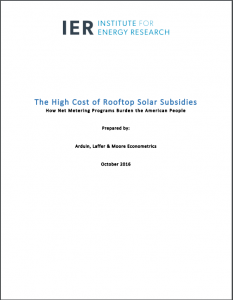Full Title: The High Cost of Rooftop Solar Subsidies How Net Metering Programs Burden the American People
Author(s): Arduin, Laffer & Moore Econometrics
Publisher(s): Institute for Energy Research
Publication Date: October 1, 2016
Full Text: Download Resource
Description (excerpt):
The Institute for Energy Research released a report highlighting the severe costs that rooftop solar subsidies and state net metering policies impose on the American people. The report titled, “The High Cost of Rooftop Solar Subsidies,” prepared by Arduin, Laffer & Moore Econometrics, noted the following key findings:
Solar subsidies force poorer Americans to foot the bill for wealthier Americans
- Many states mandate that utilities pay residential solar power generators the full retail rate for electricity generated. This results in utilities paying two to six times the market price for energy.
- Net metering policies force non-solar customers to subsidize these extra costs.
- Solar consumers tend to be more well-off than non-solar customers, which means that less affluent Americans are paying for wealthier rooftop solar consumers.
- For example, Arizona solar customers avoid around $1,000 annually in electric grid costs. These costs are passed on to the average power users, who are typically less affluent.
Solar job growth is due to subsidies, but this likely results in fewer jobs overall
- The solar industry tends to skew their jobs numbers by focusing on job growth rates instead of the absolute number of jobs added to the economy.
- Solar job estimates fail to account for jobs lost as a result of “the crowding out of cheaper forms of conventional energy generation,” “indirect impacts on upstream industries,” and from “the drain on economic activity precipitated by higher electricity prices.”
- In Germany, for example, net employment from their feed-in tariff system is estimated to be negative given “the resulting drain of purchasing power and investment in capital of private and industrial electricity consumers.”
